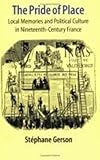The Pride of Place : Local Memories and Political Culture in Modern France / Stephane Gerson.
Material type: TextPublisher: Ithaca, NY : Cornell University Press, [2018]Copyright date: ©2003Description: 1 online resource (344 p.) : 2 maps, 22 halftones, 3 tablesContent type:
TextPublisher: Ithaca, NY : Cornell University Press, [2018]Copyright date: ©2003Description: 1 online resource (344 p.) : 2 maps, 22 halftones, 3 tablesContent type: - 9781501724312
- 306.2/0944/09034 21
- DC33.7 .G426 2003
- online - DeGruyter
| Item type | Current library | Call number | URL | Status | Notes | Barcode | |
|---|---|---|---|---|---|---|---|
 eBook
eBook
|
Biblioteca "Angelicum" Pont. Univ. S.Tommaso d'Aquino Nuvola online | online - DeGruyter (Browse shelf(Opens below)) | Online access | Not for loan (Accesso limitato) | Accesso per gli utenti autorizzati / Access for authorized users | (dgr)9781501724312 |
Frontmatter -- Contents -- Acknowledgments -- Abbreviations -- INTRODUCTION: Local Memories and Modernity -- PART 1: Le Pays -- ONE. The Field of Local Memories -- PART II: L'Amour du Pays -- TWO. Recomposing Self and Nation -- THREE. The Pedagogy of Place -- FOUR. Local Memories and the Governing of the Minds -- PART III: Le Mal du Pays -- FIVE. Town, Nation, or Humanity? -- SIX. Local Difference and the State -- SEVEN. The Quandary of Local Initiative -- EIGHT. Sur les Lieux PROVINCIAL ELITES BEFORE THE STATE -- EPILOGUE: The Return to the Local -- Selected Bibliography -- Index
restricted access online access with authorization star
http://purl.org/coar/access_right/c_16ec
Nineteenth-century France grew fascinated with the local past. Thousands of citizens embraced local archaeology, penned historical vignettes and monographs, staged historical pageants, and created museums and pantheons of celebrities. Stéphane Gerson's rich, elegantly written, and timely book provides the first cultural and political history of what contemporaries called the "cult of local memories," an unprecedented effort to resuscitate the past, instill affection for one's locality, and hence create a sense of place. A wide range of archival and printed sources (some of them untapped until now) inform the author's engaging portrait of a little-known realm of Parisian entrepreneurs and middling provincials, of obscure historians and intellectual luminaries. Arguing that the "local" and modernity were interlaced, rather than inimical, between the 1820s and 1890s, Gerson explores the diverse uses of local memories in modern France—from their theatricality and commercialization to their political and pedagogical applications. The Pride of Place shows that, contrary to our received ideas about French nationhood and centralism, the "local" buttressed the nation while seducing Parisian and local officials. The state cautiously supported the cult of local memories even as it sought to co-opt them and grappled with their cultural and political implications. The current enthusiasm for local memories, Gerson thus finds, is neither new nor a threat to Republican unity. More broadly yet, this book illuminates the predicament of countries that, like France, are now caught between supranational forces and a revival of local sentiments.
Mode of access: Internet via World Wide Web.
In English.
Description based on online resource; title from PDF title page (publisher's Web site, viewed 26. Apr 2024)


